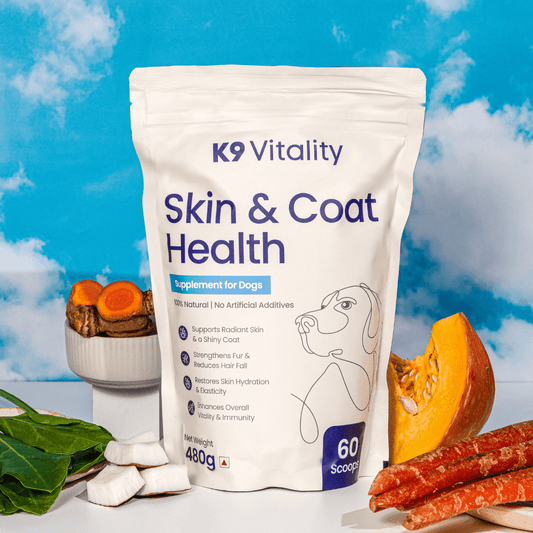
The Science Behind Collagen Supplements for Dogs: A Comprehensive Guide for Pet Parents
Share
Introduction: Do You Know What Collagen Does for Your Dog?
Have you ever wondered why collagen is making waves in the world of pet health? Do you know how collagen supplements work and why they matter for your dog’s long-term well-being? If not, you're not alone. Thousands of dog parents are starting to explore the science behind this vital protein, and many are discovering transformative health benefits for their beloved companions.
This guide, brought to you by K9 Vitality, will demystify the science behind collagen, explain its biological importance, and guide you through how it can play a crucial role in your dog’s joint, skin, and overall health. Whether your pup is still a sprightly puppy or entering their golden years, collagen could be the missing puzzle piece in their health regimen.
We’ll break down the complex science in a way that's practical and actionable. And yes, we’ll give you the insights you need to make informed choices backed by current veterinary research and canine nutrition standards.
Let’s dive in.
What is Collagen and Why Does It Matter for Dogs?

Collagen is the most abundant protein in the animal body. It's a major component of connective tissues that make up tendons, ligaments, skin, and muscles. In dogs, just like in humans, collagen plays a foundational role in maintaining:
- Joint health and mobility
- Skin elasticity and hydration
- Bone strength and structure
- Coat quality and shine
Natural Collagen Decline with Age
As dogs age, their natural collagen production decreases. This can lead to a range of health issues, including:
- Joint stiffness or arthritis
- Skin dryness or sagging
- Brittle nails
- Dull or thinning coat
This is where supplementation becomes not just helpful, but essential for many dogs, particularly senior dogs or breeds prone to joint problems.
Types of Collagen in Dogs: What You Need to Know
There are 28 known types of collagen, but the following are most relevant to your dog’s health:
Type I Collagen
- Found in skin, bones, tendons, and ligaments
- Improves skin health, supports bones and teeth
Type II Collagen
- Concentrated in cartilage
- Essential for joint health and flexibility
Type III Collagen
- Found in skin, lungs, and blood vessels
- Works alongside Type I for skin elasticity and organ support
A high-quality dog collagen supplement should ideally support all three types or be formulated to focus on your dog’s specific needs.
The Science: How Do Collagen Supplements Actually Work?
Collagen supplements typically come in hydrolyzed form, meaning they’ve been broken down into smaller peptides for better absorption. Once consumed, these peptides are absorbed in the small intestine and distributed via the bloodstream to targeted tissues.
Benefits Proven by Research
- Joint Health: Studies have shown that hydrolyzed Type II collagen reduces joint pain and improves mobility in dogs with osteoarthritis.
- Skin and Coat: Supplementation improves hydration, elasticity, and resilience in the skin, contributing to a shinier, healthier coat.
- Gut Health: Collagen supports the lining of the digestive tract, reducing inflammation and promoting better digestion.
Signs Your Dog Might Need Collagen Support
 Here are some telltale signs that collagen supplementation could be beneficial:
Here are some telltale signs that collagen supplementation could be beneficial:
- Difficulty standing, walking, or climbing stairs
- Skin that feels dry or flaky
- Dull, brittle, or shedding coat
- Slower healing from injuries
- Age-related stiffness or limping
If any of these symptoms sound familiar, a collagen supplement could significantly improve your dog's comfort and vitality.
Choosing the Right Collagen Supplement: Tips from K9 Vitality
Not all collagen supplements are created equal. Here’s what to look for:
1. Hydrolyzed Collagen (Collagen Peptides)
- More bioavailable and effective
2. Clean and Transparent Ingredient List
- No fillers, artificial preservatives, or unrecognizable chemicals
3. Supplement Type
- Powders tend to mix easily with food and are easier for consistent dosing
4. Sourcing
- Look for marine or grass-fed bovine sources
5. Added Joint-Support Nutrients
- Glucosamine, chondroitin, and MSM for added benefit
K9 Vitality recommends integrating collagen into a holistic approach, combining diet, exercise, and other supplements as needed.
How to Introduce Collagen Into Your Dog’s Diet
Here’s a simple step-by-step guide:
- Start with Small Doses: Begin with a smaller-than-recommended dose and gradually increase over 7–10 days.
- Mix with Meals: Sprinkle powder on wet or dry food. You can also dissolve it in water or broth.
- Monitor for Changes: Improvements may be visible in coat sheen, energy levels, or mobility within 3–6 weeks.
- Consult Your Vet: Especially if your dog has preexisting health conditions.
Common Myths About Collagen for Dogs
Myth #1: Dogs Get Enough Collagen from Their Regular Diet
Not true. Most commercial dog foods are cooked at high temperatures, which destroys natural collagen.
Myth #2: Only Senior Dogs Need Collagen
Incorrect. Active breeds, large breeds, and puppies with rapid growth can all benefit from collagen support.
Myth #3: Collagen is Only for Joint Pain
While it's excellent for joints, its benefits extend to skin, digestion, and even immune support.
Conclusion: Your Dog Deserves to Thrive
Collagen is more than just a health trend; it's a scientifically backed, biologically vital protein that supports your dog’s joints, skin, bones, and digestive health. As a pet parent, being proactive about your dog’s well-being can lead to years of additional mobility, comfort, and joy.
K9 Vitality is here to guide you through every step. From understanding what collagen is, to selecting the right supplement, to integrating it effectively into your dog’s routine, we’re committed to helping you support your dog’s health from the inside out.
Investing in your dog's collagen health today could mean fewer vet visits, fewer aches and pains, and more tail-wagging moments tomorrow.
If you’re serious about your dog’s long-term vitality, now is the time to take action.






